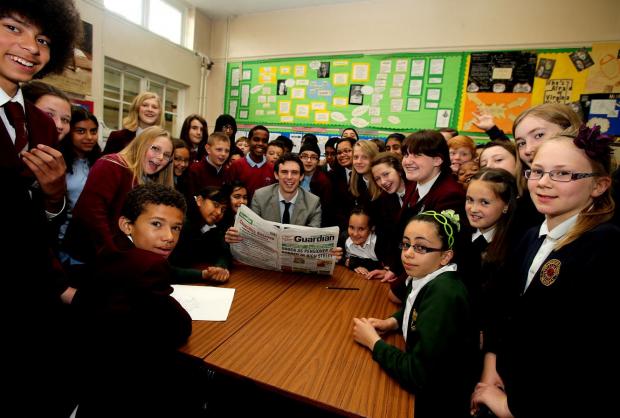Am v excited about this! It's a project I've wanted to run for a while now but had previously suffered due to this being one of the busiest times in an art teacher's year (KS 4+ 5 exams and coursework deadlines, marking exams and coursework, moderating internally, mounting end of year exhibition, dealing with external moderators- phew!) and then realising transition day is due in a few weeks!
So the plan is...
I have invited our main primary feeder schools to spend the day with us in high school (10 students from each school). We will split students into groups of 3.
1 student representative from each school be put in each group. The aim is to come up with ideas for and write and publish a newspaper about 'life in a secondary school'. Here's a brief description of the day:_
• 9.00-9.30-
Workshop run by journalist from local paper
• 9:30-10:10-
Group brainstorm of ideas and themes to write articles on and list of key
questions- ‘what do you want to know about life at this high school?’ Record these ideas on post-its and
stick on board.We will have prepared and stuck post its with the names
and role of members of staff to be interviewed eg if someone is curious about food in the school there will be the name of the head of catering to be interviewed by the students. Split into learning groups (one student
from each school). Each student must select one post-it and be responsible for
writing up the article, the subject of which will be on the post it they have
selected, however the interviews will be conducted with all team members present plus one of our student ambassadors to act as guide. Short session for individual time to record what interview questions they would like to ask on their subject in
preparation for their article. Stop and share questions as class- scribe to
record on display board to act as prompts and success criteria. Working now in their groups of 3, students must come
together, pool resources and work out a set of 10 key questions to ask in preparation for each
article. Each group to be assigned one of our student guides from Yr 8.
• 10:10-
11:20 Begin interviewing process, gathering info and photos for articles-
groups will work as a team to interview, make notes and gather info, this will
then be the responsibility of one team member to be turned into a finished
article. Guides to assist groups
• 11.20-
11.35 Break time
• 11.35-
12:30- As above. Supplementary/ extension articles to be decided on and
researched. Give students prepared texts (school prospecti and course descriptions from heads of departments) and access to school site to gather
additional quotes to include in article Reading prepared briefings, summarising
key info and then synthesising into an article, also to draw picture illustrating an aspect of their article. Yr 12 students to be used here (4-6 in total) as sub editors, moving from group to group and providing oversight and support where necessary.
• Lunch
• 1:10-2:10-
Writing articles and creating newspaper
• 2:10-2:40
Peer review and editing of articles within team- 2 rounds at 15 mins each
• 2:45-
3:05- Final review/ plenary
• Our students throughout the day, to write their own articles and gather info along
the way for blog/ article in our school newspaper about the making of this project
This newspaper will be printed and distributed to (hopefully) every primary school child attending our secondary next year in advance of transition day. It's my hope that this will de-mystify life in secondary school and put a stop to the inevitable urban legends that seem to come out ('is it true you can get detentions during the summer holiday?') and build a sense of familiarity with the school before transition day and of course, September. I also hope to put the making of this project on an online blog written by our student helpers and some generous staff members reflecting on the day to bring another set of points of view to our prospective students.
So there it is! Due to take place a week today, will update as things progress, fingers crossed!!!
My sincere thanks to my colleagues in the English Dept, whose support and enthusiasm have been essential to this project!



